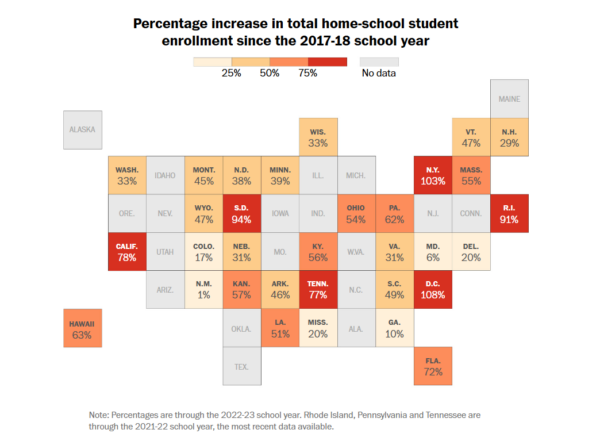Why Homeschooling is Booming Post-Pandemic
How COVID-19 Fueled a Surge in Homeschooling
Back in 2020, when the world was paralyzed by the COVID-19 pandemic and the subsequent lockdowns, millions of families flocked to homeschooling to provide their children with a stable education during the crisis. Homeschooling had already been slowly but steadily rising in the United States since the turn of the century. However, the COVID-19 pandemic saw it grow exponentially.
Interestingly, this was especially pronounced among people of color, who traditionally have been the least likely to seek alternative education methods. The U.S. Census Bureau reported that homeschooling among black families rose five-fold in 2020. Thus, the crisis introduced millions of people to homeschooling who would unlikely consider it a viable educational option otherwise.
A Permanent Shift in Education Choices
It was assumed that most of these families would return to conventional schooling once the pandemic had passed, but this was not the case. A large number of families continued to homeschool. Consequently, the results show that homeschooling numbers have continued to trend upward since 2020. In the 2018-2019 school year, it is estimated that 3.7% of American families were homeschooled. During the pandemic, those numbers ballooned to 11.1% for the 2020-2021 school year (source). The following year saw a decline as the pandemic waned, but not as significant as many expected: 2022-2023 saw homeschooling numbers level off around 5.2%. By the 2024-2025 school year, these numbers rose to 5.4%, a net increase of 1.7% since before the pandemic (source).
Homeschooling Growth Varies by State
In concrete terms, this means homeschooling has grown by about 1.5 million since the pandemic. The growth varies by state, with some states showing astronomical levels of increase. A study by the Washington Post showed the homeschooling population of California rose by 78%, South Dakota by 94%, and Washington D.C. by a whopping 108%. Take a look at the Washington Post’s graphic, which depicts growth from 2017-2018 to 2022-2023:

One market research firm projects homeschooling globally to grow by about 10.3% each year for the foreseeable future, with the homeschooling market projected to be valued at $10.35 billion by 2031. Essentially, homeschooling has continued to grow rapidly since the pandemic and shows no signs of ceasing. Around 50,000 new students are entering homeschooling every single month (source).
Why Are Families Choosing Homeschooling Over Public Schools?
Every new family that enters homeschooling does so in preference to traditional schools. This is either by pulling their children out of institutional education or declining ever to enroll them from the start. Why are so many parents deliberately choosing to keep their children out of public education?
This summer, Newsweek ran a piece on this very question. Titled “Why Parents Are Pulling Their Kids Out of School” by Jenni Fink and Suzanne Blake, the article introduces us to various families and explores their rationale for homeschooling (incidentally, one of the moms interviewed is Arlena Brown, a speaker at the Catholic Homeschool Conference who has been on our Homeschooling Saints Podcast multiple times).
Top Reasons Families Are Turning to Homeschooling
Several reasons were offered by the homeschooling families interviewed in the Newsweek piece, including:
- Individualized needs due to learning disabilities
- Concerns about bullying in institutional schools (the incidence of bullying in schools has risen 14% since 2017 according to one study)
- Greater emphasis on family life
- Concerns about unsafe school environments (i.e., violence, mass shootings, etc.)
- Opportunities for richer educational engagement and exploration of interests
- The desire for more parental involvement in the child’s education
- Concerns about culture war issues in public schools
- The monolithic nature of public education
Homeschooling as the Ultimate Educational Customization
As one can see, the reasons are as varied as the homeschooling families themselves—and, as the article points out, these families are increasingly diverse in every respect. Ultimately, however, it all comes down to customization. Joel Grewe, executive director of HSLDA Action, America’s preeminent homeschool advocacy organization, says this is an extension of how society itself has changed. Grewe says:
“We have gotten to a place in society where we expect to be able to customize how they live large chunks of their life. How do we work? Is it remote? Can we travel? We struggle to build that customization in our education system, and homeschooling is the ultimate customization of education. And so, in a sense, I think it’s a very logical extension of how we look at society and say, ‘Hey, we customize how we do every other part of our life and now it’s how we educate our kids.'”
The Future of Education: Customization or Innovation?
As technology and culture developments continue this customization trend, we can expect homeschooling to appeal to a broader audience. Amir Nathoo, the CEO of Outschool, one of the most successful secular online education platforms, argues that institutional schools must innovate or stagnate in the race for educational customization. “As the number of parents withdrawing their children from public schools continues to increase, traditional models must either evolve to better meet students’ and families’ needs or face declining enrollments and increased competition,” Nathoo said.
Homeschool Connections: Supporting Catholic Homeschoolers
Here at Homeschool Connections, we are proud to be at the forefront of the homeschooling movement’s Catholic wing. Now, in our sixteenth year, Homeschool Connections puts the power of customization at your fingertips, with over 450 live and recorded online courses taught by some of the best instructors in the Catholic world.
What are your thoughts on this topic? Join me and other homeschooling parents at our Homeschool Connections Community or our Facebook group to continue the discussion!






